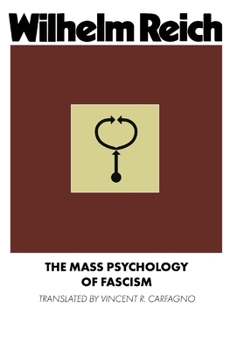The Mass Psychology of Fascism
Select Format
Select Condition 
Book Overview
Wilhelm Reich's classic study, written during the years of the German crisis, is a unique contribution to the understanding of one of the crucial phenomena of our times-fascism. Reich firmly repudiates the concept that fascism is the ideology or action of a single individual or nationality, or any ethnic or political group. He also denies a purely socio-economic explanation as advanced by Marxist ideologists. He understands fascism as the expression of the irrational character structure of the average human being whose primary, biological needs and impulses have been suppressed for thousands of years.The social function of this suppression and the crucial role played in it by the authoritarian family and the church are carefully analyzed. Reich shows how every form of organized mysticism, including fascism, relies on the unsatisfied orgastic longing of the masses.The importance of this work today cannot be underestimated. The human character structure that created organized fascist movements still exists, dominating our present social conflicts. If the chaotic agony of our times is ever to be eliminated, we must turn our attention to the character structure that creates it; we must understand the mass psychology of fascism.





